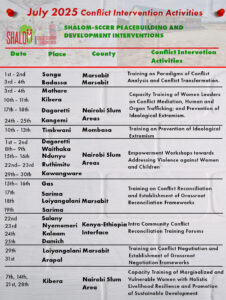By: Arthur Magero Abonyo MA,
After six years of Shalom-SCCRR’s peace work along the Kisumu-Nandi borderline, communities attest to numerous transformative outcomes and impact. Shalom-SCCRR conducted a total of 82 conflict transformation and peacebuilding training workshops. 1,457 influential local peace actors were empowered with analytical skills and techniques for Conflict Transformation and Peacebuilding.
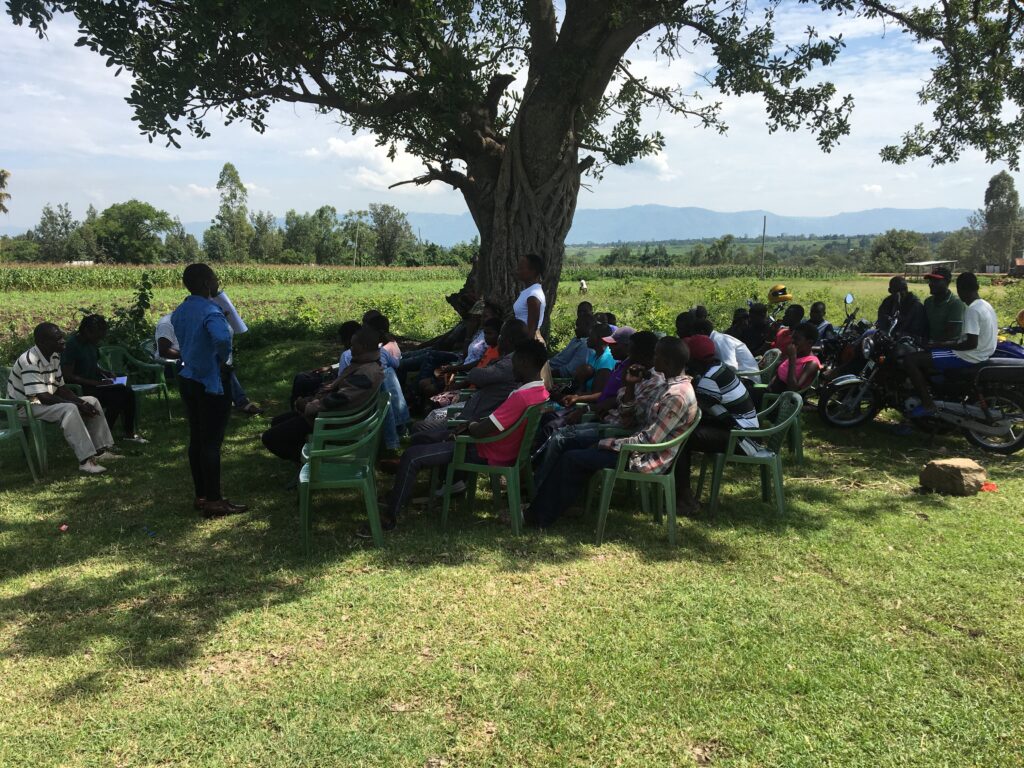
The context in which Shalom-SCCRR intervened was marked by violent electoral violence, contestation over land ownership going back to colonial times, administrative boundaries, encroachment into private land (emanating from a historical conflict between settlers and squatters), frequent cases of livestock theft, deep-rooted ethnic distrust, among other issues. Structural violence evident in the lack of sufficient institutions to enable people to meet their basic human needs and actualize their potentials pervaded the general conflict environment. Shalom also gives great attention in its conflict transformation methodologies to addressing the ontological needs of security, identity and equality of participation in all its peacebuilding interventions. Given the context, conflict history, issues and dynamics, Shalom-SCCRR’s team, conducted a comprehensive conflict analysis involving the local communities, administrative officers, religious leaders, women and youth leaders, and other relevant stakeholders.
Shalom-SCCRR methodology is focused on addressing the root causes of both manifest and structural violence by empowering the local communities to be drivers and architects of their own peace process.
Lenah Chemworlauds Shalom-SCCRR’s intervention at the Kisumu-Nandi borderline:
“We appreciate the intensive training we received from the Shalom-SCCRR’s team of highly qualified facilitators. Through this empowerment, we now have the capacity to deal with inter-communal conflict promptly and more effectively. Peace awareness and participation in the larger community has enhanced our work in dealing with any arising conflict situations,” observes Chemwor, Shalom-SCCRR’s trained community mediator.
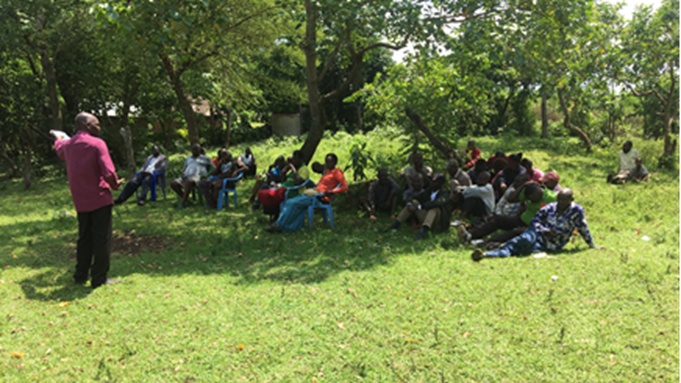
“Trust takes time to build or restore,”Molly Omwa, Shalom trained Lead Community Facilitator, observes. She further remarks, “Shalom-SCCRR found two communities [Luo and Nandi] that were exhausted by the interminable inter-communal violence. Their intervention has changed all that… Today, the language is about collaboration, cooperation, dialogue, and reconciliation, because they have changed our perceptions, attitudes, and behavior – communities have all the more embraced non-violent ways of resolving conflicts.”
Currently, the areas that were adversely affected by the inter-communal violent conflict are vibrant due to increase in inter-communal trading, opening of new industrial companies which have created employment thus growing the local economy and, stability of other socio-economic infrastructures.
Shalom-SCCRR also made significant contributions toward education by providing material support to more than 20 schools that lacked basic infrastructure, teaching and learning materials among other educational needs. The school/educational projects have benefitted more than 12,700 pupils and students.
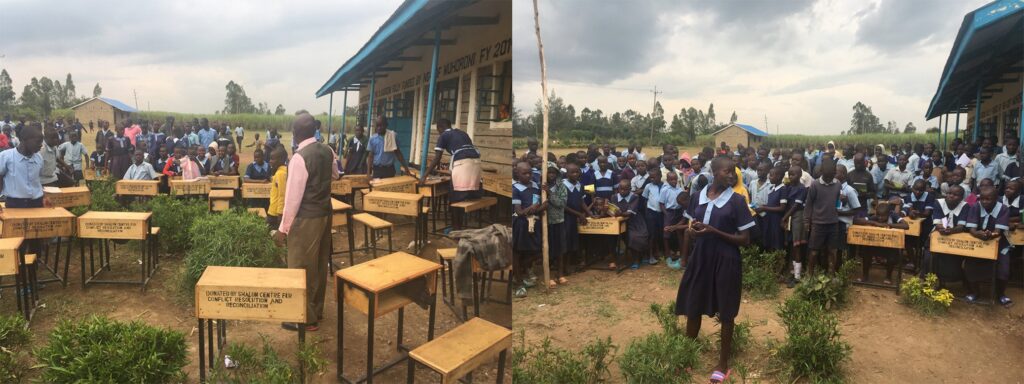
Impact of our work is benefiting a huge population in hundreds of thousands, from both communities living, along the borderline. Communities are enjoying peace dividends, joint development outcomes, and sustained peaceful coexistence.
“We are ready to compete with other renowned and nationally highflying schools because Shalom has assisted us with Science Laboratory equipment,” remarks Mr. Paul Macharia, the principal at St. Peter’s Soba Secondary School.
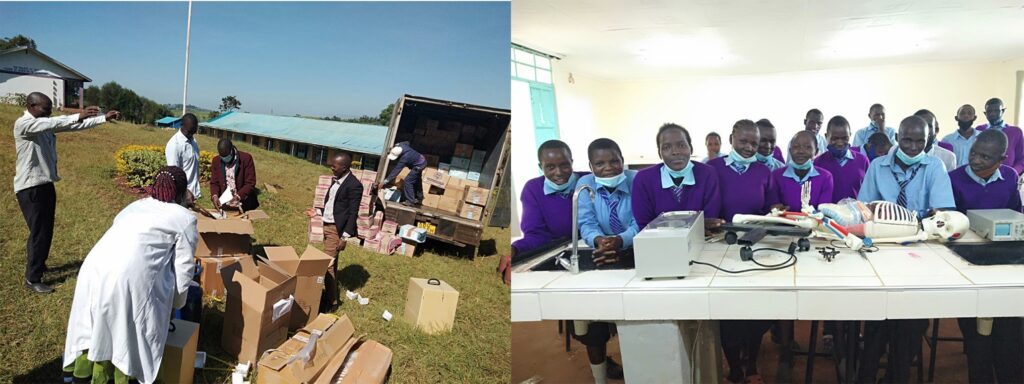
Mr. Jackim Otieno, the head teacher of St. George Wuok Primary School appreciates Shalom-SCCRR support:
“With gladness and humility, we are privileged to have standard classrooms funded by Shalom. We also received desks from them. Shalom has indeed transformed the schools along the Kisumu-Nandi borderline which lacked even the most basic infrastructure for teaching and learning. Through conflict transformation training, Shalom Peace Education Syllabus, pupils and parents have embraced inter-ethnic schooling.”
Mr. Otieno further remarks, “From the educational material support that we have received from Shalom, our academic grades have tremendously improved.”
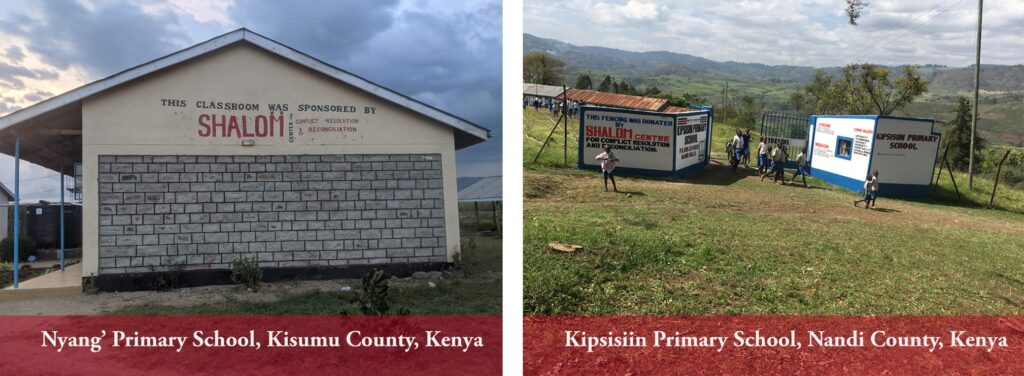
“We want our future to be defined by peace and coexistence through schooling and playing together as pupils from diverse ethnic communities. We thank Shalom for supporting our schools with classrooms, fencing, desks, tables, chairs, stationeries, textbooks, and empowering us with peacebuilding skills.” Immaculate Akinyi Otieno, the head girl at St. George Wuok Primary School, expresses her appreciation to Shalom-SCCRR.
Peace Education Syllabus implementation is one of the enduring successes of Shalom-SCCRR’s intervention. Eight peace clubs were formed, 16 peace club patrons and members were trained and they have been active to initiate and lead peace activities in schools and communities.
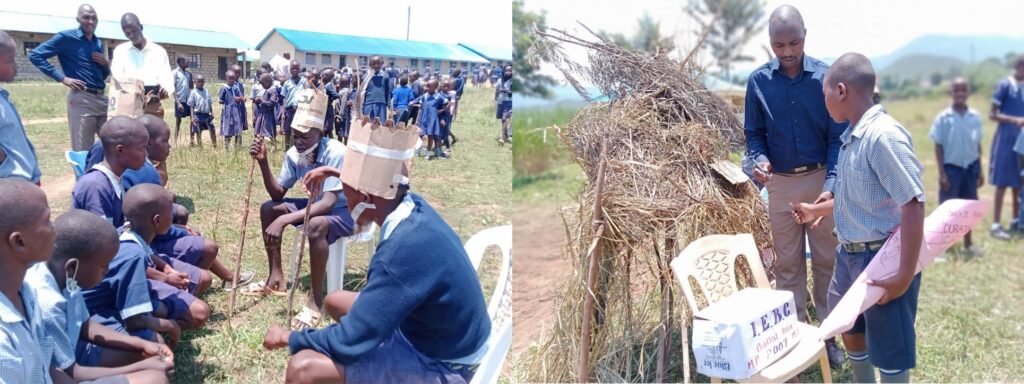
In conclusion, Mr. Benedict Olik Oloo, a community animator, commends the six-year work of Shalom-SCCRR. Mr. Oloo, a Shalom-SCCRR trained community animator says:
“As a community leader, empowered by Shalom-SCCRR, we are grateful to the donors who generously supported our peace and educational development journey. We are blessed to have benefited from your support, and you remain special to us. Your support has changed our lives and this journey has convinced us that we can transform violent conflict to positive peace.”
Author: Arthur Magero Abonyo MA, Project Officer, Kisumu- Nandi Project
Relevant Links
- Shalom-SCCRR (2023). 2022 Shalom-SCCRR Results and Achievements. https://shalomconflictcenter.org/2022-shalom-sccrr-results-and-achievements-2/
- Shalom-SCCRR. (2022). 2009-2021 Shalom-SCCRR Results and Achievements. https://shalomconflictcenter.org/2009-2021-shalom-sccrr-results-and-achievements/
- Shalom-SCCRR. (2023). Shalom-SCCRR 2022 Conflict Transformation and Peacebuilding Results & Achievements. https://shalomconflictcenter.org/2022-shalom-sccrr-conflict-transformation-peacebuilding-results-and-achievements/
- Shalom-SCCRR. (2023). 2022 Shalom-SCCRR School/ Educational Development Projects Results and Achievements. https://shalomconflictcenter.org/2022-shalom-sccrr-school-educational-development-projects-results-and-achievements/
- Prof. Wanakayi K. Omoka’s Understanding of the Philosophy and Work of Shalom-SCCRR Recollected; Augmented with 2022 Results by the Dept. of Monitoring, Evaluation, Research, and Learning (MERL). https://shalomconflictcenter.org/recalling-prof-wanakayi-k-omoka-phd-understanding-of-the-philosophy-and-work-of-shalom-sccrr-augmented-with-2022-shalom-sccrrs-achievements-and-results/
- Mwangi, F. (2022).Shalom-SCCRR Empowered Communities Sustaining Peace at the Kisumu-Nandi Borderline during the August, 2022 Kenya’s General Elections.https://shalomconflictcenter.org/shalom-sccrr-empowered-communities-sustaining-peace-at-the-kisumu-nandi-borderline-during-the-august-2022-kenyas-general-elections/
- Prof. Omoka. W. K and Devine, P. R. (2020). Human Rights are a Foundation of Shalom-SCCRR’s Conflict Resolution and Reconciliation Interventions. https://shalomconflictcenter.org/human-rights-are-a-foundation-of-shalom-sccrrs-conflict-resolution-and-reconciliation-interventions-2/
- Shalom-SCCRR. (2022). Shalom Empowerment Center (SEC) Addressing Violence against Women and Children: Concept Document. https://shalomconflictcenter.org/eastern-africa-shalom-empowerment-center-sec-addressing-violence-against-women-and-children-concept-document/
- Magero A. (2022). Shalom-SCCRR success journey with the community towards building cohesion to counter inter-ethnic and political intolerance along the Kisumu-Nandi borderline.https://shalomconflictcenter.org/shalom-sccrr-success-journey-with-the-community-towards-building-cohesion-to-counter-inter-ethnic-and-political-intolerance-along-the-kisumu-nandi-borderline/
- Devine, P. R. (2018, August 11). Submission to Public Consultation on the Irish Aid White Paper. https://shalomconflictcenter.org/submission-to-public-consultation-on-the-irish-aid-white-paper/
- Devine, P. R. & Odote, P. L.(2017). Kenya Elections 2017: Empowering communities at risk of violence to be resilient. https://shalomconflictcenter.org/kenya-elections-2017-empowering-communities-at-risk-of-violence-to-be-resilient/
- Erot, P. (2017). BBC and Shalom-SCCRR Confer; Engagement on the Potential Peace and Conflict Issues during and after Kenya’s October 2017 Elections. https://shalomconflictcenter.org/bbc-and-shalom-sccrr-confer/
- Shalom-SCCRR. (2020). Shalom-SCCRR signs MoUs with The Senator George J. Mitchell Institute Queen’s University, Belfast, & Edward M. Kennedy Institute, Maynooth University.https://shalomconflictcenter.org/shalom-sccrr-collaborates-with-the-queens-university-of-belfast-edward-m-kennedy-institute-for-conflict-intervention/
- Watson, T. (2017). Fr. Patrick Devine and Shalom’s Methodology Have Impact in Northern Ireland.https://shalomconflictcenter.org/fr-patrick-devine-speaks-out-on-conflict-resolution-and-peace/
- Ganiel, G. (2017). Fr Patrick Devine on Conflict Transformation in Eastern Africa. https://gladysganiel.com/uncategorized/fr-patrick-devine-on-conflict-transformation-in-eastern-africa/
- Magero, A. (2020). Briefing Paper No. 7: An Analysis of Luo-Nandi Conflict, Kenya. Persistent Inter-Ethnic Hostility and its Impact on Socio-Economic Livelihood along Kisumu-Nandi Borderline.https://shalomconflictcenter.org/briefing-paper-no-7-an-analysis-of-luo-nandi-conflict/
- Moran, M. (2022). Shalom Chairman delivers lecture at Harvard Kennedy School. https://shalomconflictcenter.org/shalom-chairman-delivers-lecture-at-harvard-kennedy-school/
- Okoth, G. (2018). Gearing to go: Shalom requested to intervene Shalom (SCCRR) lays foundation for long-term peacebuilding along the volatile Kisumu/Nandi border in Western Kenya. https://shalomconflictcenter.org/gearing-to-go-shalom-requested-to-intervene-shalom-sccrr-lays-foundation-for-long-term-peacebuilding-along-the-volatile-kisumunandi-border-in-western-kenya/
- Okoth, G. & Magero, A. (2022). A Conflict Transformation Journey with Community Leaders turns Historic Foes into Formidable Collaborators Working for Peace and Development along the Borderline of Kisumu and Nandi Counties. https://shalomconflictcenter.org/a-conflict-transformation-journey-with-community-leaders-turns-historic-foes-into-formidable-collaborators-working-for-peace-and-development-along-the-borderline-of-kisumu-and-nandi-counties/
- Molumby G. (2022). Resolution of conflict requires hope and research. https://www.irishpost.com/news/resolution-of-conflict-requires-hope-and-research-238003
- Kibe, E. (2022). Fr. Patrick Devine PhD, Lecture at the National Justice & Peace Network (NJPN) Conference 2022, UK. https://shalomconflictcenter.org/fr-patrick-devine-phd-lecture-at-the-national-justice-peace-network-njpn-conference-2022-uk/
- Magero, A. (2021). Protecting children’s lives, securing infrastructure by Shalom-SCCRR at Kipsisiin Primary School in the volatile Kisumu/Nandi borderline. https://shalomconflictcenter.org/protecting-childrens-lives-securing-school-infrastructure-by-shalom-sccrr-at-kipsisiin-primary-school-in-the-volatile-kisumu-nandi-borderline/
- Okoth, G. & Koech, M. (2017). Kenya Elections 2017; Response to Shalom’s Interventions. https://shalomconflictcenter.org/kenya-elections-2017-response-to-shaloms-interventions
- Shalom-SCCRR. (2019). Strong Irish Endorsement of the Work of Shalom (SCCRR); Society of African Missions (SMA), & Misean Cara (funded by Irish Aid). https://shalomconflictcenter.org/strong-irish-endorsement-of-the-work-of-shalom-sccrr/
- Kibe, E. (2022). Shalom-SCCRR’s International Chairman, Rev. Dr. Patrick Devine addresses the Harvard Kennedy School, USA. https://shalomconflictcenter.org/shalom-sccrrs-international-chairman-rev-dr-patrick-devine-addresses-the-harvard-kennedy-school-usa/
- Mullan, D. (2018). The Welcome Address by Prof. Philip Nolan, President Maynooth University, and the Response by Deputy Chief of Staff, Major General Kevin Cotter to Rev. Dr. Patrick Devine’s Lecture on ”Peace, Security and Sustainable Development in Eastern Africa”https://shalomconflictcenter.org/response-by-deputy-chief-of-staff-major-general-kevin-cotter-to-rev-dr-patrick-devines-lecture-on-peace-security-and-sustainable-development-in-eastern-africa/


